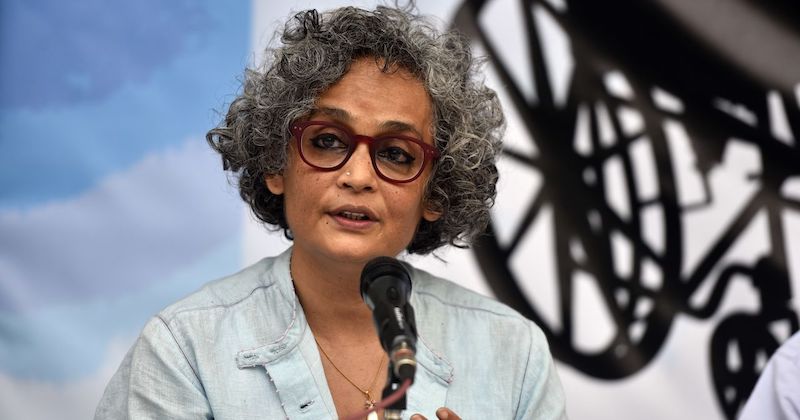
Uma apologia de “O Deus Das Pequenas Coisas”, romance de estréia da escritora indiana Arundathi Roy
Por Eduardo Carli de Moraes
JULHO DE 2024 – Faz uns 10 anos que vivi uma experiência literária das mais saborosas e marcantes lendo, de cabo a rabo, uma edição barata (paperback) de “The God Of Small Things” (“O Deus das Pequenas Coisas” comprado num sebo de Toronto pela bagatela duns 5 dólares canadenses. O premiadíssimo romance de estréia da Arundathi Roy, vencedor tanto do Pulitzer quanto do Booker Prizer, publicado no Brasil pela Companhia das Letras, é uma das obras-primas da literatura neste século e uma inesquecível obra-de-arte atenta aos destinos dos dalits, “os intocáveis”, a casta mais oprimida da sociedade estamental da nação mais populosa da Terra.
Dez anos depois, em 2024, testemunhamos a cruel perseguição promovida contra ela pelo governo hindu-nacionalista de extrema-direita encabeçado pelo recentemente re-eleito Modi e seu Partido BJP (Bharatiya Janata Party): a escritora é alvo de criminalização por parte do governo altamente islamofóbico de Modi por declarações públicas que fez a respeito da situação na Caxemira – um território no qual Arundathi Roy fez incursões enquanto ativista-jornalista, acompanhando as guerrilhas maoístas, tendo escrito sobre o tema a impressionante obra “Walking With The Comrades”. A Caxemira é uma espécie de Palestina da Índia: um território que o Estado indiano trata de maneira análoga àquela com que o Estado sionista trata Gaza. Atenta ao que rola na Caxemira, Arundathi afirma que os líderes políticos da Índia estão transformando o país numa “empreitada Hindu-fascista”.
Faz uma década, escrevi esta longa apologia ao livro de estréia daquela que, como disse Alice Walker, é “uma das melhores intelectuais e escritoras de nosso tempo”, de uma grandeza que a autora de “A Cor Púrpura” compara a Dickens, Hugo, Woolf ou Charlotte Brönte. Aprecie abaixo, em inglês, o texto originalmente publicado no blog Awestruck Wanderer: https://acasadevidro.com/deus-das-pequenas-coisas/
SAIBA MAIS: Why does India hate Arundhati Roy? India’s government is targeting the acclaimed author because she speaks to the most foundational corruptions that underlie the socioeconomic and political pillars of the Indian state. By Somdeep Sen, Associate Professor of International Development Studies at Roskilde University. @ Al Jazeera: www.aljazeera.com/opinions/2024/7/22/why-does-india-hate-arundhati-roy
“She is one of the great writers and intellectuals of our time. I was thinking about what makes her a really great writer, a really great person, and a really great rebel: someone who listens more than she talks. Someone who goes to find where the silence is, and tries to understand why the silence is there. She is so precious and so rare. Like Charles Dickens, like Charlotte Brontë, like Virginia Woolf, like Victor Hugo, like all those wonderful writers who spoke for the people who had no voice. Arundhati Roy joins a long and proud list of people who care deeply, and who listen deeply, and who then speak fearlessly. This is our salvation, this kind of writer, this kind of person…” – ALICE WALKER , author of Pulitzer-Winning novel The Color Purple (filmed by Steven Spielberg)
I. A SUNBEAM LENT TO US TOO BRIEFLY
To listen attentively, to care deeply, to speak fearlessly: these are some of the many virtues of our brave sister, Arundhati Roy. Even if she never writes another book of fiction, she already deserves a place in the history of English-language literature: The God Of Small Things, the winner of 1998’s Booker Prize Award, can be easily included in the Olympus of the 20th century’s true masterpieces in the realm of novels.
Her story-telling talents are such that it’s hard not to get hooked on the tale she’s telling so compellingly: The God Of Small Things entrances with its language, seduces withs its humour, and then delivers, apart from a delicious verbal banquet, a blood-soaked tragedy.
She told BBC that she never meant to write a thriller, but her novel is filled with thrills, like a rollercoaster ride through Aymenem, Kerala, India, where Arundhati Roy grew up. Perhaps it’s her own way of embarking on a Proustian recherche du temps perdu.
Yet this book ain’t a memoir or an auto-biography, but something much more ambitious: an Indian tragedy, set to the background of a nation in turmoil. Bloody messy turmoil. We only need to remember what happened in Gujarat in 2002 – more than 1.000 Muslims butchered and murdered openly in the streets by Hindu fanatics, and more than 150.000 fleeing the scene of the pogroms as refugees – to have a glimpse of the turmoils of India. Its dawned to the 21st century happened on the brink of a nuclear war with Pakistan, while Kashmir was held hostage by India through the biggest military occupation in the word. This is a scary picture of India which Arundathi Roy paints – and it rings so much truer than the demagogues propaganda.
She belongs to a pantheon of writers capable of writing passionately, with words that a sensible reader feels at the same time as he deciphers them. While reading The God Of Small Things, I was frequently aware not only of an intellectual process going on in my head – the whole process of language-deciphering – but of something else, ringing with truthfulness and verve: Arundathi’s words were injected with feeling. These are sentences written to be felt rather than simply understood. In a prose so marvellous that I can only find something similar in writers, which I cherish a lot, such as Anton Tchekov, Katherine Mansfield, Heinrich Heine, Manoel de Barros…
And yet The God of Small Things, so often, seems to focus on banalities, on minute occurrences – for example, the funny description of the twins in their “delight with underwater farting”. Several times, it seems she’s jokingly playing with language like Lewis Carroll or James Joyce did so well. She evokes images – for example: a child being forced to eat spinach – that seem at first sight to be trivial chronicles of day-to-day life. But Arundhati Roy portrays this commonest matter of life as something dynamic, in perpetual motion, and that can undergo sudden changes. As if she is saying that the extraordinary is the most ordinary thing there is, yet not all among us can see it and realize it. The motto, running like an underground stream in her narrative, is this: “things can change in a day”. So we better be prepared.
When you reach the last page of the book, and you look behind you, remembering the path you’ve traveled together with Arundhati, you can feel the wisdom of every minute detail to the general composition. It reminds me of an interesting piece of literary criticism written by an excellent Artist-of-the-Word, Cioran:
“No true art without a strong dose of banality. The constant employment of the unaccustomed readily wearies us, nothing being more unendurable than the uniformity of the exceptional.” (CIORAN, The Trouble With Being Born, p. 37)
In other words: a work-of-art doesn’t necessarily need to be an overdose of extraordinary occurrences and events. The common fibre that weaves human life must be used to compose a portrait of human life as it is – and life undeniably includes in its bosom much minute trivialities and minor events without further consequence. Until it comes: the day that changes everything.
The genius of Arundathi Roy’s book lies in her hability to portray how the extraordinary disrupts the web of common life. Thus the leitmotiv in The God of Small Things – “things can change in a day”, which means: your whole life may be suddenly transformed. It may be thrown out of its usual tracks, like a derailed train bound to a blind-date with fate.
After reading this book, I also emerge from it like a diver rising up from the seas, where he saw and witnessed little fish behind devoured by big ones (just like in Radiohead’s song). Life as a frail flame that can be blow off by the wind. Life as quicksand where our feet can never quite stand in firm ground. Life as box-of-surprises (not necessarily gentle ones).
These are some of the feelings about life Arundathi’s novel may evoke and provoke. When she describes injustices being done against the powerless, her words have the beauty and the courage of similar ones written by Simone Weil or Emma Goldman. It seems to me that Arundathi depicts the destructibility of life as something that’s part of its essence – mortality is something no mortal can escape from – and yet Arundathi’s voice is far from depressing.
Her words have an up-lifting effect, like an injection of enthusiasm shot right in the veins. It’s a voice filled with such compassion and boldness, and such lucid indignation and witty critique, that listening to her is a delight. Art can be empowering, it can communicate enthusiasm, it can teach a frame of consciousness, and it also certainly can act upon life – like Spinoza taught, it can become something we love because it enhances our vitality, adds vigor to our conatus.
This book may be playful and filled with wit, but ain’t kitsch at all: there’s pedophilia and police brutality and class struggles ending up in bloody mess. There’s scenes to make a punk’s hairdo spike up. There’s enough to make Chuck Norris cry. She extracts beauty from tragedy, from loss, from terrible grief, as if Arundathi was some sort of magic bee capacle of manufacturing sweet honey even from fly-trap plants. From brief sunbeams drowned out too soon.
Elizabeth Bishop’s famous poem says that “the art of losing isn’t hard to master”; Arundhati Roy also paints a poignant portrait of loss, and also points out that even the most precious things can easily be lost (“things can change in a day…”). Like the fateful day in which Sophie Mol tried to cross a river on a little small-boat with her cousins, the twins Rahel and Estha. Touched by tragedy in childhood, the twins learn from life some lessons that are usually reserved for older people. The wisdom that dawns upon them, written in their flesh by death’s killings upon the living, is stated very cleverly by little Estha: “Anything can happen to anyone, so it’s better to be prepared.”
The wisdom of keeping eyes opened to the possibility of the worst, and yet continuing the struggle to act in order to build something better, is something that, it seems to me, is one of the many virtues of Arundhati’s work. Maybe she agrees with Gramsci that we should keep burning two flames, simultaneously: pessimism of the intellect, optimism of the will.
It’s always good news to discover that Humanity still holds among the living some people so wise and so courageous.
* * * * *
II. HOLES IN THE UNIVERSE
In The God Of Small Things, I kept bumping into some re-occuring events, popping up several times in the narrative: the Holes in the Universe. No: this novelist isn’t venturing into the territories of astrophysics, nor trying to decipher the mystery of supermassive Black Holes. Arundhati Roy uses “holes in the universe” in order to portray the human mind’s experience of death: “Joe was dead now. Killed in a car crash. Dead as a doorknob. A Joe-shaped Hole in the Universe.” (p. 113)
Of course not only death can open these holes in the Universe, subjectively-perceived, and Arundathi knows it well. It’s so brilliant the way she is able to communicate a lot with a single word, when for example she writes “die-vorce” (p. 124). This is no crass error of misspelling, and this is no mere typo that the publisher’s reviser didn’t detect: this, my friends, is poetry in action.
Instead of writing the word as the dictionary demands (“divorce”), she subverts official language, and in this process links divorce with death. Both death and divorce – understood not only as the end-of-marriage, but as a sudden separation between affectively bonded humans – have the power to “open” these Holes in The Universe that The God Of Small Things so frequently talks about.
She also uses, with equivalent brilliancy, the witty expression “die-able” (154), to convey the sense of “being able to die”, of being in a state of danger.
The way she deals with Time in her narrative is also quite fascinating, and it works really well: instead of following a straight path in her story-telling, always going forward in linear time, she messes up with our coordinates. Like a brat willing to spread confusion in a world of bureaucrats and stock-market money-junkies, she sets the clocks to different times and steps back to laugh at how confused and lost in Time we really are.
We are short-sighted short-term-beings, who are neither beasts nor prophets. She does not only take us on a ride through India – it’s also a ride through Time. For example: Ammu’s death occurs in the middle of the novel, at page 154 (out of 315), and yet Ammu is present in the very last chapter. She even says the very last word of the book (“Tomorrow”).
“The church refused to bury Ammu. So Chacko hired a van to transport the body to the electric crematorium. He had her wrapped in a dirty bedsheet and laid out on a stretcher. Rahel thought she looked like a Roman Senator. (…) It was odd driving through bright, busy streets with a dead Roman Senator on the floor of the van. (…) Outside the vans windows, people, like cut-out paper puppets, went on with their paper-puppet lives. Real life was inside the van. Where real death was.
The crematorium had the same rotten, rundown air of a railway station, except that it was deserted. No trains, no crowds. Nobody except beggars, derelicts and the police-custody dead are cremated there. People who died with nobody to lie at the back of them and talk to them. When Ammu’s turn came, (…) the steel door of the incinerator went up and the muted hum of the eternal fire became a red roaring. The heat lunged out at them like a famished beast. Then Rahel’s Ammu was fed to it. Her hair, her skin, her smile.
20 minutes: that’s how long Chacko and Rahel had to wait for the pink receipt that would entitle them to collect Ammu’s remains. Her ashes. The grit from her bones. The teeth from her smile. The whole of her crammed into a little clay pot. Receipt No. Q 498673.”
(pg. 154-155)
Arundathi paints images of holes in the Universe that emerge and take the place where joy was once intensely present. She portrays beautifully some occurrences that are far from cute – including pedophilia; child-sized coffins; police brutality against people from the lower castes; several acts of violence (both verbal and physical).
As if she was trying to paint a huge mural of a world – ours, the real one – where careless words are legion, and where sometimes death comes to claim life’s yet to be lived, or who had many fruitful years ahead of them. Untimely deaths.
No one should live somewhere where infancy is normally considered as a very “die-able” age. And yet India, may I remind us, has the largest population of undernourished children in the planet. And the emergence of shopping malls and billionaires, of Bollywood movie-stars and triumphant stock markets, ain’t stopping neither the tragedy of massive deaths by famine, of children and adults alike, nor the tragedy of massive suicides of empoverished peasants, which sometimes end up killing themselves by drinking pesticides made by Monsanto…
Without resembling in any way a political pamphlet, the novel is in fact deeply political. I would strongly recommend to you Arundhati Roy’s books of essays, excellent and thought-provoking books such as Algebra of Infinite Justice and Listening to Grasshoppers: Field Notes on Democracy.
After reading them recently, I got the impression that, both in her fiction and non-fiction writings, she delivers a portrait of India as a country still suffering from the tragedies that ensue from the rigid social hierarchy of a Caste System.
Baby Kochamma, for example, feels very proudly that she is higher and nobler in society than those she calls “the sweeper class” (pg. 132). It seems to be one of the main intentions of The God of Small Things to give voice to the voiceless. To portray those who are so often killed without leaving behind them no portrait. No footprints in the sand’s shore. Those Power wants to throw into Oblivion. Arundhati Roy, through the means of such a compelling story, communicates to the reader the lived experience of the lower castes, the toiling masses, and she makes us suffer together with those who suffer from the anathema and the stigma of being “Untouchables”, the pariahs of Indian society.
Some books, after we finish them, never quite leave us. They become part of us. We move on, but transformed by them. We have been taught to care more for the voiceless, for the powerless, for the wretched of the Earth; we have learned empathy towards small frail things such as ourselves. We now have been enriched by the new holes we now carry in our hearts: a Sophie-shaped hole in the Universe; a Velutha-shaped hole in the Cosmos; an Ammu-shaped hole in the Fabric of Life…
* * * * *
III. THE LOVE LAWS (AND THE RISKS OF TRANSGRESSION)
It’s evident that Arundhati Roy is pretty well-read, and that she has learned a lot from the masters of the English Language: she evokes images and characters from Joseph Conrad’s The Heart of Darkness, for example, and she inserts into her narrative verses from Shakespeare’s Julius Caesar.
Apart from the direct references to other books, she also can remind the reader of highly creative artists such as Virginia Woolf, Samuel Beckett or Julio Cortázar, especially because of her ability to invent a language of her own, a verbal landscape that’s quite unlike any I’ve ever read.
Of course some of the scenes may remind us of other novels – for example: when Arundanthi described the minute details of the family business Paradise Pickles & Preserves (“Emperors of the Realm of Taste!”), I felt some resemblance to John Steinbeck’s marvellous narrative in The Winter of Our Discontent. And wild rivers, with dangerous secrets lurking below the surface of the waters, may also make some experienced reader reminisce the days he spent surfing the pages of Melville’s magnum opus Moby Dick.
Of course a little boat, with three children in it, crossing a river in India, is quite different from Ahab’s vessel, in its epic journey in search of the giant white whale. But what I mean to point out is this: The God of Small Things is such a great book also because it can evoke in us past reading experiences, and good thrilling ones such as Herman Melville or Steinbeck wrote. Arundhati Roy’s work can “drown” us in a literary experience of aesthetic amazement.
However, there’s no l’art pour l’art here: this novel can teach us a lot about India, if we care to listen to the narrative’s details. When you least expect it, she writes, for example: “Some days Estha walked along the banks of the river that smelled of shit and pesticides bought with World Bank loans.” (p. 15) That’s how politics manifests itself in this novel: acting directly on the characters and their environment. Politics is something the flesh-and-blood, the pulsating heart, knows about by its effects on life.
There’s a mist of mystery surrounding the narrative that contributes a great deal to the thrilling sense of suspense of the book. He are told right from the beginning about the tragic loss of Sophie Mol, but Arundhati takes her time in unveiling what happened to this English child visiting her cousins and aunts in India.
Sophie and her mother came to India after experiencing trauma in England – the death of Joe – but unaware that they would be further traumatized rather than healed. After all this is India, a country filled with “public turmoils”, where “various kinds of despair competed for primacy”, “poised forever between the terror of war and the horror of peace”, and where “Worse Things kept happening” (20).
I see in The God of Small Things a tragedy set in India, a country where “caste issues are very deep-rooted” (263). People are “conditioned from birth”, says Comrade Pillai, to think and feel in accordance with the caste system – which is, of course, a system of stratification of social classes in which a lot of violent conflict keeps exploding (in his century, the Mumbai terrorist attacks of 2008 and the Gujarat pogrom of 2002 stand as examples). This Caste Segregation is the political background for a tale of forbidden love, and love loved in spite of laws forbidding it.
Ammu and Valutha are a bit like Romeo and Juliet, daring to love when the social landscape around them deems it a scandal. What an obscenity, to love someone outside of one’s caste! In Arundathi Roy’s novel, two persons from two castes who aren’t supposed to mix end-up choosing the experience of forbidden love, even tough they know this could be their doom.
When Ammu and Velutha join their bodies in the delights of wild love-making, there’s a big fear lurking inside them. There’s an anguished panic poisoning their delightfully forbidden love. This love, in the wildness of its force, tramples underfoot the taboos of caste. They will be punished, for certain, by their transgression. This love is risky business. By daring it, you gamble with your life.
It’s quite similar to what happens in Shakespeare’s Romeo and Juliet: the “clash” and conflicts that sets apart Capuletos and Montecchios, as you well remember, is the background for the forbidden love between Romeo and Juliet. They transgress the Laws of Segregation with their Union in Love. Though brief, it’s a symbol of love’s power to demolish frontiers and unite what has been kept severed. Romeo and Juliet refuse the segregation imposed by their families and by the social structure, and dare to love and unite amidst a conflict filled with bloody hate.
I wouldn’t say that The God Of Small Things is inspired by Romeo and Juliet, but rather that Shakespare’s famous play deals with similar dilemmas.
Rahel and Estha, Ammu and Velutha, are characters which transgress the Love Laws, which lay down who should be loved, and how much, and according to what dogmas and rules. “…once again they broke the Love Laws. That lay down who should be loved. And how. And how much.” (p. 311)
Ammu and Velutha unite in the art of seeing the common, beyond differences, in the boundary-transcending light of a loving eye. They transgress the Love Laws and then they are crushed to an horrendous death. And yet the genius of Arundhati lies not only in the tragic grandeur she can convey in her story-telling, but also in the lush sensuality of her imagery. The sex scenes at the very end of the novel are the greatest example. Love-making description skyrockets to Shapespearean heights in these pages, and the beauty of them resembles the beauty in D. H. Lawrence’s Lady Chatterley or in Abdel Kechiche’s film Blue Is The Warmest Color…
In Arundhati’s Roy, the tragedy of the lovers runs parallel with the children-in-the-boat subplot. An accident happens, the children’s boats hits some obstacle in the waters of the river, and then the fragile vessel throws into the water Rahel, Estha and Sophie. “Just a quiet handing-over ceremony. A boat spilling its cargo. A river accepting the offering. One small life. A brief sunbeam.” (pg. 277)
Velutha – the Romeo of the forbidden-love saga – now is claimed by another play, another saga: he’s to be a scape-goat, the one to be punished by the death of a child. Velutha, tender lover and hard-working man, an activist of the Marxist Party and a friend of maoists, ends up being beaten to death by the police. Beaten out of existence. To be buried in the Pauper’s Pit.
And then one suddenly awakes to the fact: what impels Arundhati Roy to write is clearly indignation for the horrors and strifes that she describes. She suffers with these crushed lives because of her extraordinary capacity for empathy. An hability to have attentive antennas to listen to the voices of human diversity.
In recent years, amazing works-of-art also reflected upon false accusations and unjust punishments – Ian McEwan’s Atonement and the film The Hunt by Thomas Vinterberg are examples take occur to me. It would certainly be interesting to attempt a comparison of these works with The God of Small Things. My impression is that Arundhati Roy deals with matters of Crime and Punishment with such depth and intelligence as one can find only in the works of great masters such as Franz Kafka or Dostoiévski.
Alive, awake, alert. That’s what some books do for us: they kick-start our mind’s capacities to marvel and wonder. They expand our horizons by unveiling the magnitude (it’s huge) of all that we can’t understand. They enchant us with their language, until we wake up to what what we were previously unaware of. They tell stories that we feel that needed to be told. When he reach the last page, we feel that the book isn’t finished, it will reverberate and echo inside us, perhaps for years.
We close this book and it’s possible we’ll be burdened by a grief similar to the one we feel when a loved-one dies. I surely carry now within me a Velutha-shaped hole in the Universe, a Sophie-shaped hole in Existence. And yet I feel enriched by these new holes, by these tales of transgressive love, by these human kaleidoscope flowing in Time on the Earth Woman’s bosom.
“We belong nowhere”, Chako said. “We sail unanchored on troubled seas. We may never be allowed ashore. Our sorrows will never be sad enough. Our joys never happy enough. Our dreams never big enough. Our lives never important enough. To matter.”
Then, to give the twins Estha and Rahel a sense of Historical Perspective, he told them about the Earth Woman. He made them imagine that the earth – 4600 million years old – was a 46-year-old woman. It had taken the whole of the Earth Woman’s life for the earth to become what it was. For the oceans to part. For the mountains to rise. The Earth Woman was 11 years old, Chacko said, when the first single-celled organisms appeared. The first animals, creatures like worms and jellyfish, appeared only when she was 40. She was over 45 – just 8 months ago – when dinosaurs roamed the earth.
“The whole of human civilization as we know it”, Chacko told the twins, “began only 2 hours ago in the Earth Woman’s life.”
It was an awe-inspiring and humbling thought, Chacko said, that the whole of contemporary history, the World War, the War of Dreams, the Man on the Moon, science, literature, philosophy, the pursuit of knowledge – was no more than a blink of the Earth Woman’s eye.
“And we, my dears, everything we are and ever will be are just a twinkle in her eye…”
The God Of Small Things is a fountain of life: drink it up with might, O you who thirst for Truth, Freedom, Justice, O you all who grieve everyday by witnessing them crushed!
* * * * *
You might also like:
[youtube id=http://youtu.be/gnTS9gHCZoI]
[youtube id=http://youtu.be/1sBEfixrCL8]
[youtube id=http://youtu.be/Vw3Lwj6imxo]
[youtube id=http://youtu.be/fHz8cpULupo]
BBC’s Book Club Interviews Arundhati Roy (Audio Only)
Download Arundhati Roy’s books for free on Library Genesis
Publicado em: 25/05/14
De autoria: casadevidro247
comentários
Incrível, texto maravilhoso! Quero ler mais dessa escritora agora.
awestruckwanderer
Comentou em 26/05/14
Valeu, Laise! Fico feliz de saber que o texto te instigou a ler a Arundhati Roy, ela é brilhante! Este romance, “O Deus das Pequenas Coisas”, é o único livro dela traduzido para o português, até onde sei, e está publicado pela Cia de Bolso. Eis o link para a Livraria Cultura, se quiser conferir:
http://www.livrariacultura.com.br/scripts/resenha/resenha.asp?nitem=2647229
Também recomendo muito os livros de ensaios (não-ficção), tem mtos ebooks para download gratuito aqui:
http://libgen.org/search.php?req=arundhati+roy&open=0&view=simple&column=def
Volte sempre!

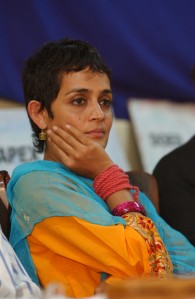
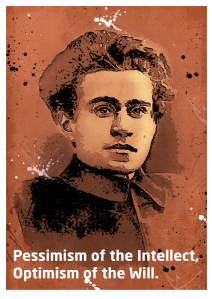

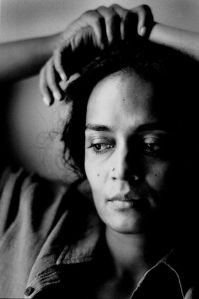
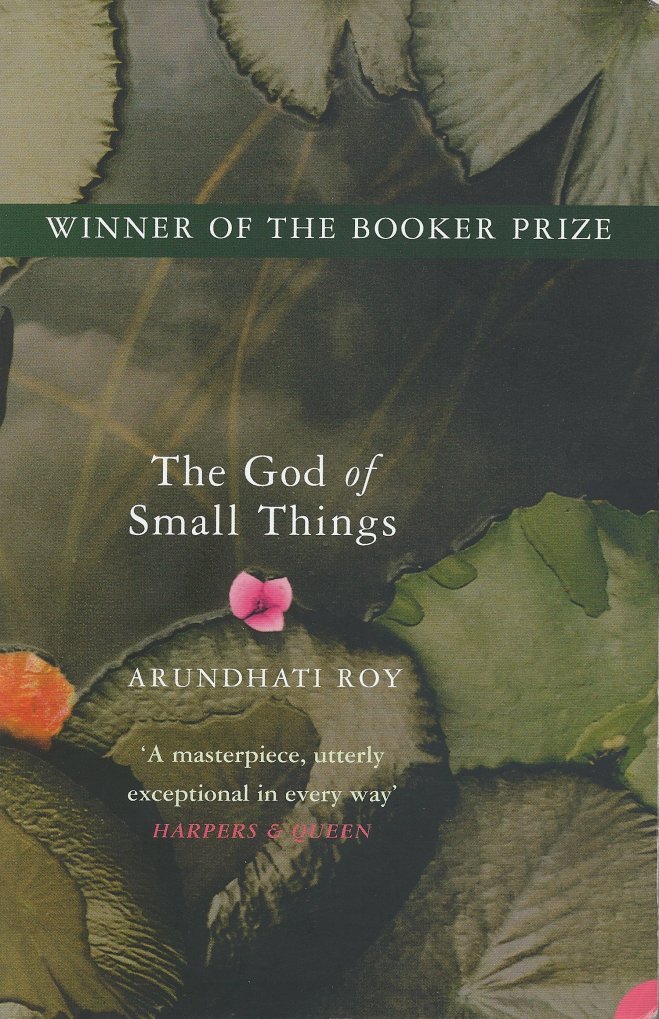

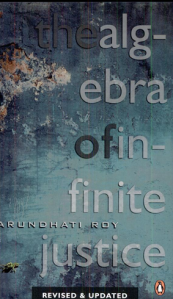
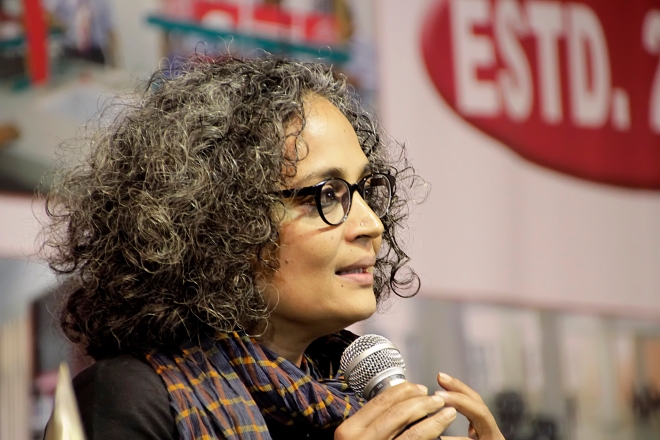
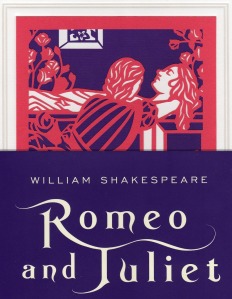
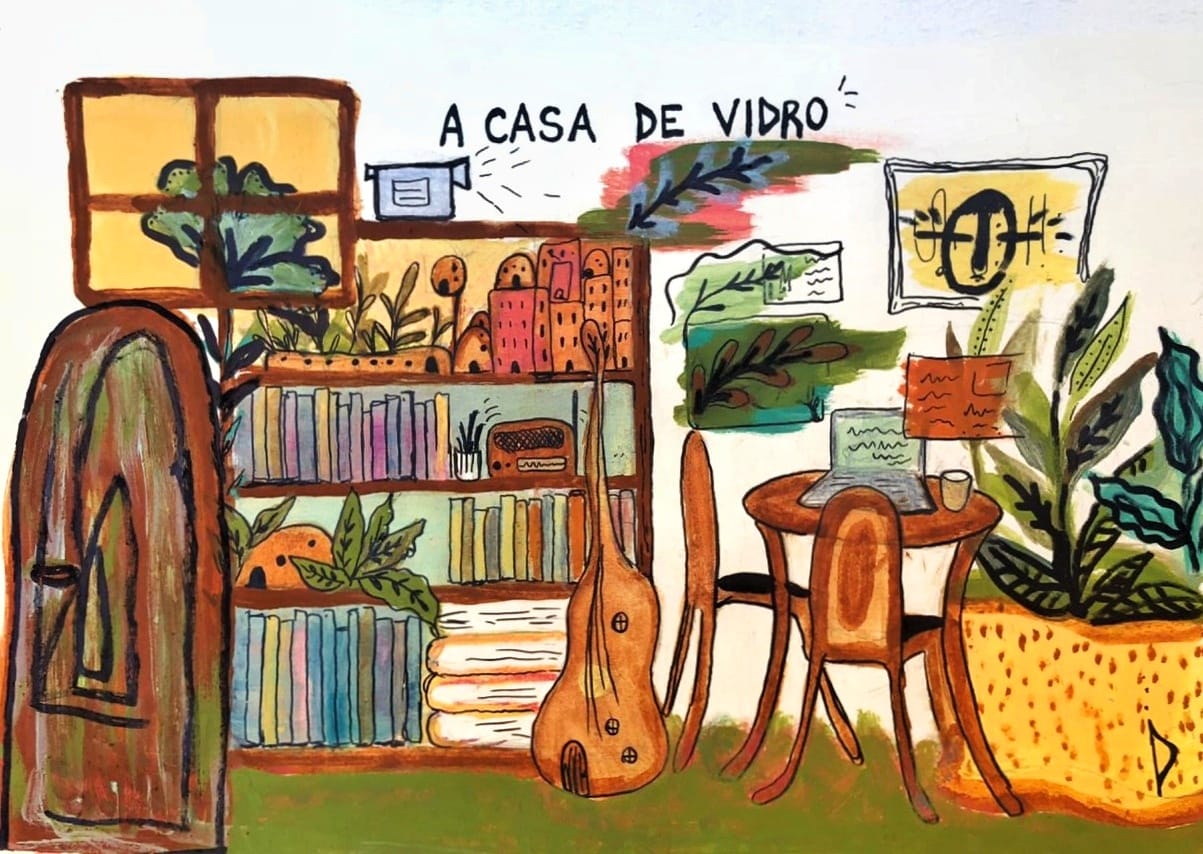
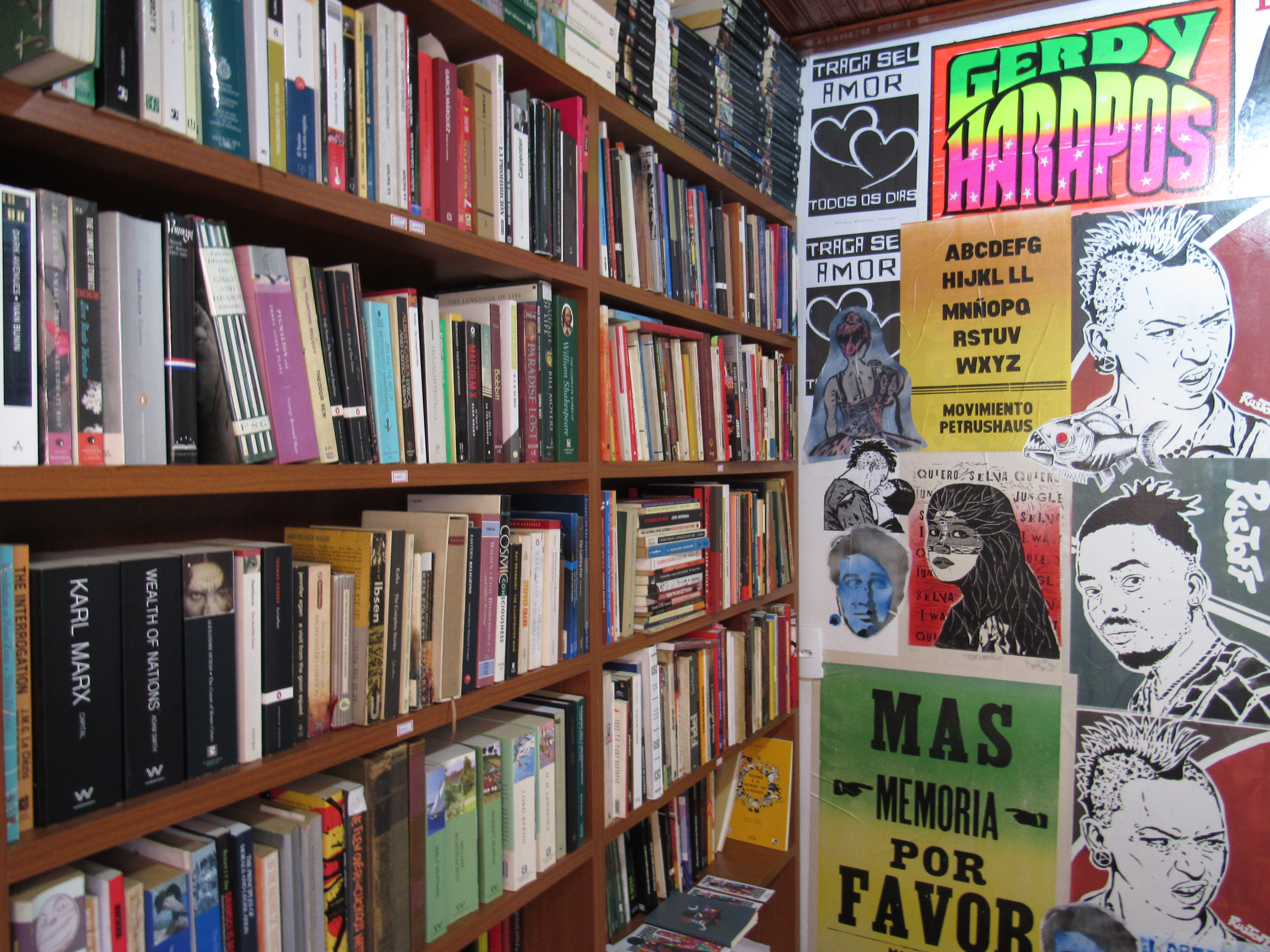



Laise Mendes
Comentou em 25/05/14